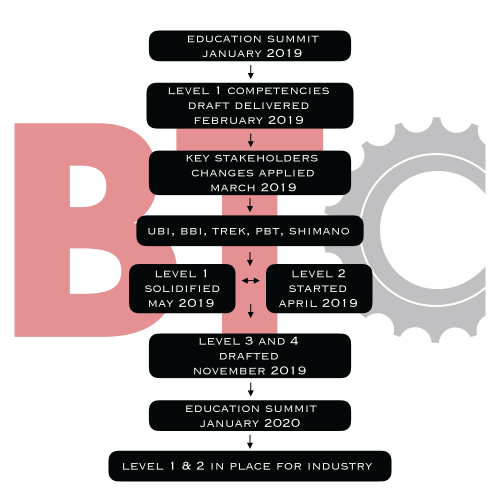DEL MAR, Calif. (BRAIN) — The industry is moving ever closer to a long-held goal of creating a standardized mechanic certification. Before the CABDA West trade show opened here in January, stakeholders from a surprisingly large number of organizations devoted to bicycle technical training met to begin the process of developing a multilevel certification.
The industry's two best-known mechanics schools, Oregon's United Bicycle Institute and Colorado's Barnett Bicycle Institute, were in attendance at the summit, along with representatives from the technical education programs at Trek, Specialized, SRAM, Shimano, Park Tool and others, including several regional education programs.
"I've been in the industry over 40 years, and I've not seen that broad of a spectrum of stakeholders in the same room having an open and serious talk about this," said Ron Sutphin, the president of UBI.
The Professional Bicycle Mechanics Association organized the summit and helped create the Bicycle Technical Council, a PBMA initiative.
"It took a great deal of diplomacy to get all of the interested parties in the same room," said Jeff Rowe, vice president of the mechanics association.
The BTC's goal is to decide on the elements of an industry standard certification similar to the ASE standard used in the auto industry. Various schools and technical programs would continue to offer their own brand-specific education and teaching styles above and beyond the certificate. But the certificate would attest to a mechanic's recognized level of skill, which would be useful to potential employers, manufacturers, insurance carriers and others.
Jeff Donaldson, the general manager of BBI, said he's cautiously optimistic that the discussions will lead to a single industry-recognized certification.
"I think we would all benefit," Donaldson said. "Mechanics, manufacturers, retailers, consumers — the entire ecosystem would benefit if we all had confidence in what a mechanic at a certain level can perform. It will give everyone more confidence in the work that is being done."
UBI and BBI have had a decades-long friendly rivalry just tense enough that when Donaldson and Sutphin were seen chatting together at the summit, some mechanics starting taking photos to mark the occasion.
Sutphin acknowledged the rivalry, but noted that he has had a long history of communicating with BBI's founder, John Barnett, who is now retired. "I'm stoked to be working with Jeff [Donaldson] on this," Sutphin said. "It's pretty unique."
While optimistic about the effort, Sutphin said there are enough elements under discussion that a professional facilitator might be needed to reach agreement.
"The fact that all the key players are involved makes me optimistic," he said. "But I've been through some processes like this, and I think for us to move forward we might consider doing some fundraising so we can bring in a hired-gun outside facilitator. I'm doing some research on that now," he said.
Sutphin said that both UBI and BBI offer certificate programs that are recognized by state education regulators and others. "We [at UBI] have to have a thoughtfully designed curriculum and repeated standardized testing. And we have to show that our students actually have success finding jobs in order for us to be licensed by the state," he said.
The PBMA itself, as well as several of the mechanic schools, already offer to test mechanics to a Level 1, providing a certificate to experienced working mechanics without requiring them to take a class. However, currently each program's Level 1 test varies slightly.
Rowe is optimistic that the group can develop a Level 1 certification relatively soon, with more advanced levels on the horizon.
"With Level 1, the discussion comes down to things like, 'should hydraulic brake service be included?'" Rowe said. "We've got pretty far on that and we will continue to hash it out. It's the closest thing to democracy I've seen in action. Level 2, 3 and 4 might be more of a food fight."


